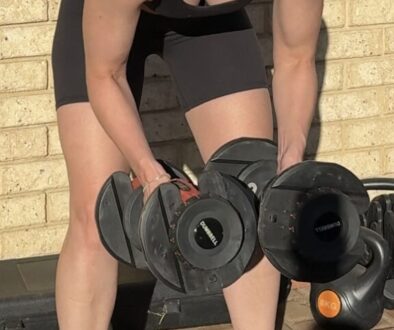Sleep is an important part of a healthy lifestyle that often gets neglected. It has many benefits including improved mood, muscle recovery, helping with weight loss goals, as well as giving us energy to get through a busy routine.
Being a busy professional, it can be challenging to prioritise enough sleep and wind down after a long day. Here are the top 9 strategies you can start doing to help you get better sleep.
- Addressing screen time
The blue light on screens signals to your brain that it’s daytime, which is why when you find yourself on a screen right before going to bed you may find it very difficult to get to sleep, even if you’re feeling tired. The general recommendation is to avoid screens at least an hour before bed. If watching a show or reading a book on a screen helps you wind down, use a setting to reduce blue light exposure such as putting your device on night mode.
2. Avoid stressful tasks or activities right before bed
Things like scrolling on social media or checking work emails right before bed can cause your mind to race, making it very hard to switch off for the night.
3. Temperature
Our bodies find it easier to sleep in a room of a cooler temperature, which is why you may struggle to sleep in hot weather. Adjust the temperature as much as you can with either aircon or adjusting blankets.
4. Dark room
Similar to the blue light on screens, light signals to your brain that it’s day time, making it harder to fall asleep. Try to keep your room as dark as you can with lights switched off and curtains closed, or wear an eye mask to block out any light.
5. Alcohol
Sometimes having a glass of wine after a long day is a nice way to wind down. It can make you feel sleepy at first, but you might find yourself waking up several times in the night and find it hard to fall back asleep because of how alcohol is metabolised. It’s best to stop drinking at 6pm so it has less of an impact, and limit to one drink.
6. Caffeine
Caffeine affects everyone differently, some people find that they can drink coffee at night without it affecting their sleep, and others it can take longer for it to leave their system. If you think caffeine might be affecting your sleep, try to avoid caffeinated drinks after 12pm.
7. Don’t look at the clock after going to bed
Looking at a clock when you’re trying to sleep can cause you more stress about not falling asleep, resulting in making it harder. If you have an alarm on your phone, making sure your phone is out of reach, and if you have a digital clock in your room, wear an eye mask so it’s not visible.
8. Have a consistent sleep schedule
Having a consistent time you go to bed and wake up during the week will help your body get into a routine. If you want to sleep in on weekends, going to bed and waking up an hour later than usual is fine. Any bigger deviations can make it hard to maintain a consistent sleep schedule during the week.
9. Make sure you have enough time to sleep
If you need to wake up at 6am, you would need to be asleep by 1opm to get 8 hours. Its a good idea to go to bed an hour earlier though, such as around 9pm, to allow yourself enough time to fall asleep.
When you start prioritising better sleep, you will start to notice your energy levels improving and helping you get through a busy work day.




